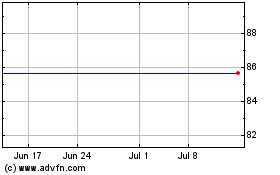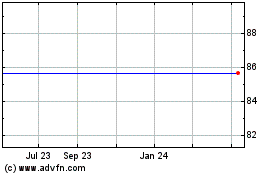By Preetika Rana
This article is being republished as part of our daily
reproduction of WSJ.com articles that also appeared in the U.S.
print edition of The Wall Street Journal (December 6, 2018).
Takeda Pharmaceutical Co. shareholders voted in favor of its
megadeal to buy Europe's Shire PLC on Wednesday, crushing an
opposition campaign that sought to derail the biggest overseas
acquisition by a Japanese company.
At least 88% of votes cast were in favor, according to Takeda,
dealing a blow to a group of longtime shareholders who had lobbied
to block the cash-and-stock merger, valued at about $58 billion
today. The dissidents argued Takeda was overpaying for Shire and
piling on too much debt to do so, though they conceded before the
vote that they hadn't won enough support to derail the deal.
The vote was a resounding victory for France-born Chief
Executive Christophe Weber, one of the few foreigners at the helm
of a major Japanese company. Buying Shire would enable Takeda to
tap into the lucrative market for rare diseases and boosts Mr.
Weber's mission to expand Takeda's footprint beyond its slowing
home market.
Shire's shareholders separately voted overwhelmingly in favor
late Wednesday.
The acquisition propels 237-year-old Takeda into the big
leagues, making the combined entity the world's eighth-largest
drugmaker by sales, and reflects how Japan's corporate titans are
looking abroad to fuel growth. Together, the companies would be
estimated to earn half their revenue from the U.S., up from the
roughly one-third that Takeda makes now. Takeda also estimates
annual savings would reach at least $1.4 billion three years after
the merger.
Mr. Weber has ruffled shareholder feathers before, cutting jobs
in a bid to consolidate research and hiring other non-Japanese
senior executives. But the Shire acquisition was his boldest move
since taking the reins in 2014.
In a sign of how ardently Japan's legacy companies are looking
overseas, Takeda increased its bid four times before Shire's board
agreed in May to settle on a cash-and-stock offer that valued it at
GBP49.01, or $66.21, a share at the time, a 65% premium over
Shire's closing share price before news of the deal surfaced in
late March.
It placed Takeda's valuation of Shire at $62 billion at the
time. Currency fluctuations and a fall in Takeda's share price mean
the current-day value is $58 billion. That still tops SoftBank
Group Corp.'s $32 billion acquisition of U.K.-based chip designer
ARM Holdings PLC in 2016 -- the largest overseas acquisition by a
Japanese company until now.
On Wednesday, Takeda's stock closed up 1% from Tuesday's close,
although it is down 25% since news of the first bid surfaced in
late March. Shire shares have gained more than 50% over the same
period.
Critics argued the acquisition saddles Takeda with debt. The
company has said it would borrow about $31 billion to fund the
deal, which puts its net debt at five times its earnings before
interest, tax, depreciation and amortization. The higher that
ratio, the lower the chance lenders advance loans, constraining the
company's ability to borrow in the future.
Members of the dissenting shareholder group argued Takeda was
paying too much for a rare-disease-focused target whose top-selling
hemophilia drugs are about to face stiff competition from a Roche
Holding AG rival that the U.S. recently approved.
The "no" campaigners, who dubbed their group TTBF or "Think
About Takeda's Bright Future," hired a former UBS Group AG analyst
to lobby American institutional investors to vote against the deal.
In recent weeks, the group won the backing of another prominent
shareholder, a former Takeda chairman who was the last member of
the founding Takeda family to run the company.
At a luncheon in New York in late October, Shigeru Mishima, the
former UBS analyst, warned 20 institutional investors, mostly
American hedge funds, about the risks associated with the deal. "'I
said, 'What's going to happen in three years when the risks
associated with the hemophilia treatment play out?'" he said.
Mr. Mishima said the group was disappointed with Wednesday's
vote, even though they knew they were likely to fall short of the
one-third of votes needed to stall the deal.
Mr. Weber said in a statement that he was delighted that
shareholders had backed the acquisition. The CEO said he is working
to create "a more competitive, agile, highly profitable, and
therefore more resilient company."
The test for Takeda, analysts said, will be its ability to
integrate Shire's empire with its own and whether expected job cuts
would lead to a backlash in Japan.
Several prominent foreign CEOs in Japan have seen their terms
end in controversy or scandal. Most recently, Carlos Ghosn was
ousted as chairman of Nissan Motor Co. after being arrested in
Tokyo on suspicion of understating his compensation in financial
reports. Mr. Ghosn has denied wrongdoing, according to Japanese
public broadcaster NHK, and hasn't been formally charged.
Mr. Weber told The Wall Street Journal in 2014 that when he
joined Takeda, he sought advice from the France-educated Mr. Ghosn
in Paris. Mr. Weber said the talk reassured him that he was up for
the challenge of thriving in Japan's insular corporate culture.
Peter Landers contributed to this article.
Write to Preetika Rana at preetika.rana@wsj.com
(END) Dow Jones Newswires
December 06, 2018 02:47 ET (07:47 GMT)
Copyright (c) 2018 Dow Jones & Company, Inc.
Shire (NASDAQ:SHPGY)
Historical Stock Chart
From Mar 2024 to Apr 2024

Shire (NASDAQ:SHPGY)
Historical Stock Chart
From Apr 2023 to Apr 2024
